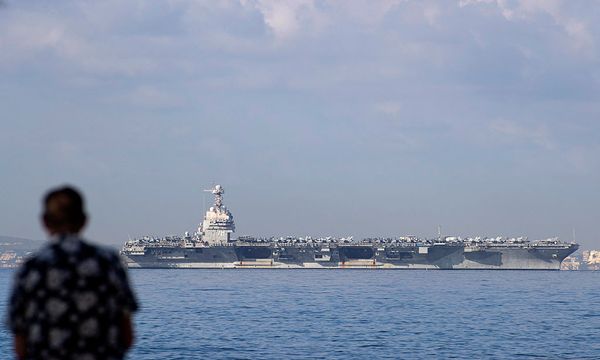
The imperial state crown, the latest incarnation of which has been resting on the Queen’s coffin as thousands of people have filed past this week, has witnessed many resonant moments in history, and a few less majestic ones too.
After the death of the Queen’s grandfather, George V, for instance, the king’s coffin was being transported from London’s King’s Cross station with the crown on top when the jolting of cobbled streets caused the diamond-encrusted globe on top, and the cross and sapphire it supports, to snap off and roll into a gutter.
Though it was hastily retrieved, the dead monarch lay in state under a mutilated crown, which many in the crowd, including the new king, Edward VIII, took as a bad omen. Eleven months later, sure enough, he abdicated.
The tradition of crowns representing royalty is “a time-honoured thing seen in cultures across the world and through deep time”, says Anna Keay, a former curator at the Tower of London who has written the official guide to the crown jewels. “The business of wearing something on your head that speaks of your status as a special person – we see it through millennia.”
In other words – enchanting or repulsive – the vast, ridiculous excess of the crown’s 2,868 diamonds, 17 sapphires, 11 emeralds, four rubies and 269 pearls is its symbolic point. These are some of their stories.
1 St Edward’s sapphire
This may be the oldest stone in the crown, having been buried as a ring, according to legend, with King Edward the Confessor in 1066 (and dug out of his grave a century later). Edward had given the ring to a beggar, the story goes, who turned out to be St John the Evangelist. The remarkable Wilton diptych, now in the National Gallery, shows an image of Edward as a saint holding an apparent sapphire ring.
On the other hand, the stone in the crown could have a different origin entirely. After the civil war, the medieval crown jewels were broken up, melted and sold; Charles II had new regalia made at the Restoration from whatever jewels he could reacquire; this sapphire wasn’t added until the Victorian era.

“The difficulty is it’s very hard to identify any of these gems to say confidently that they are the ones from before,” says Keay, now director of the Landmark Trust. In the case of the sapphire, disappointingly, “I don’t think the case is very strong … In crown terms it’s quite small. Obviously in everyone else’s terms, it’s enormous.”
2 Queen Elizabeth’s earrings
The imperial crown is so named not because of the British empire, but because of its closed-arch form, which Henry VIII adopted (instead of an open coronet) to signal his supposedly imperial status. Dangling from the centre of the arches are four large pear-shaped pearls.
According to the Royal Collection Trust, these have been linked to seven pearls that Catherine de’ Medici gave to her daughter-in-law, Mary, Queen of Scots. Elizabeth I may have later worn them as earrings, though she apparently preferred pearls on her costume.
On the other hand, notes the trust, “it appears that at least two of the pearls did not enter the collection until the 19th century”, which undermines some of the Elizabethan romance.
3 The Black Prince’s ruby
Actually a 170-carat spinel, it is certainly a very ancient unfaceted jewel that was pierced at some point in its history (a little visible lump is in a ruby plugging the hole). The Black Prince is said to have demanded the stone in exchange for helping Peter of Castile (variously known as “the Just” or “the Cruel”, depending on one’s point of view). Peter had taken the ruby from Abu Said, the ruler of Granada, after stabbing him to death as he was trying to surrender, which may settle the question of the nickname.
A delightfully dated 1960s film available on YouTube shows the Queen talking about the crown, saying of the ruby: “I always like to think of it being worn by King Henry V during the Battle of Agincourt.” Richard III may also have had it on his helmet when he was killed at the Battle of Bosworth, the Tudors retrieving it before it ended up in a car park.
4 Cullinan II
So named because, even at a boggling 317 carats, it is not the biggest jewel cut from the Cullinan gem, the biggest uncut diamond ever discovered. That, at 531 carats, is in the Sovereign’s Sceptre, also currently perched on top of the coffin in Westminster Hall.
Though some in the continent would undoubtedly welcome it back, the “second star of Africa” does not have a particularly disputed origin – unlike the Koh-i-noor diamond set in the Queen Mother’s crown, which very much does. It was found at a mine in South Africa in 1905 – “apparently [the manager] just dug it out of the rock face with his walking stick,” says the Queen in the video. The government of Transvaal bought the stone and presented it to Edward VII on his 67th birthday.
“There are two smaller pieces,” the Queen continues, “which my grandmother always referred to as ‘the chips’.”
• This article was amended on 19 September 2022 to identify the figure holding the ring in the Wilton diptych as Edward the Confessor rather than Richard II.







